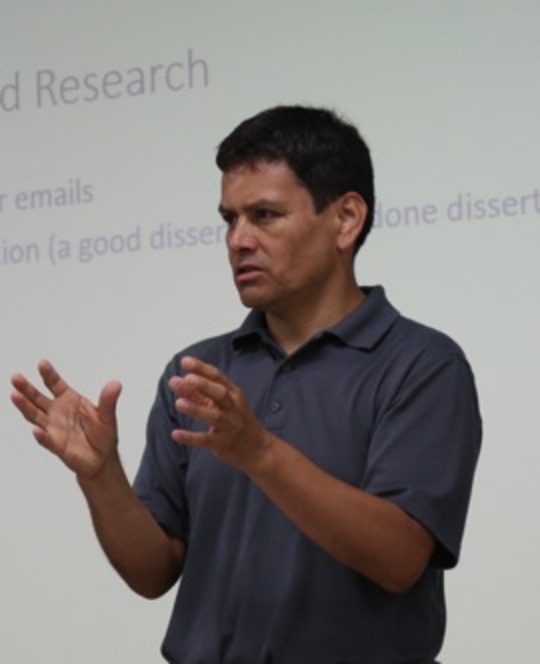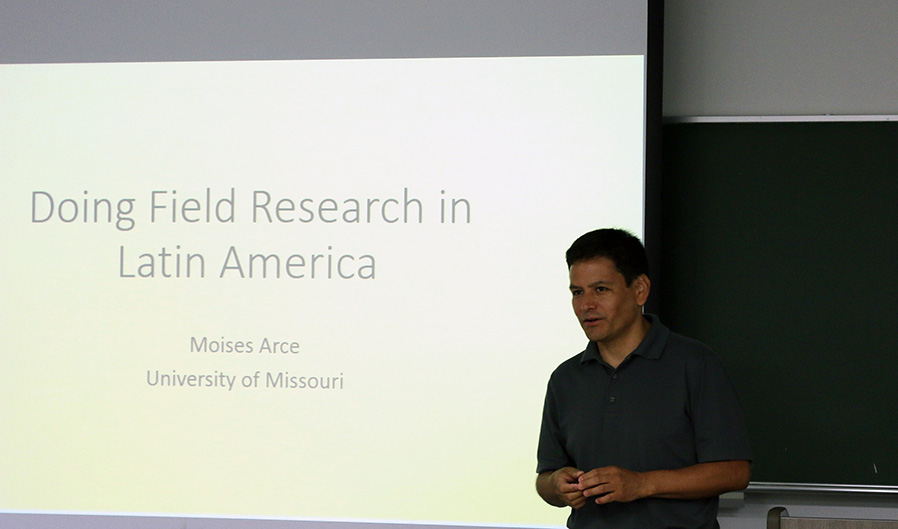
Seminar in Integrated Human Sciences for Cultural Diversity II (Report on the 9th lecture) Yoojin Koo
- Time and Date
- 16:30−18:00, Friday, July 11, 2014
- Venue
- Room 209, 2nd Floor, Building 8, The University of Tokyo, Komaba
- Speaker
- Professor Moises Arce (Professor and Frederick A. Middlebush Chair in Political Science, University of Missouri, USA.)
- Organized by
- The "Disparities and Human Rights" Unit, Integrated Human Sciences Program for Cultural Diversity, The University of Tokyo
We, members of the Project 2, had the opportunity to have Dr. Moises Arce, Professor of University of Missouri, as a speaker on July 11. He is one of the leading scholars in the field of Latin American Studies, specialized in contentious politics, social movements, market and civil society. By having him as a speaker, we expected that we would gain not only a deeper understanding of the current status of the vibrant civil societies in other countries, such as Latin American countries, but also abundant insight into how to conduct field research. This would in turn help us to gain a comparative perspective on civil society and cultural diversity.
Under the title of "Doing Field Research in Latin America," Prof. Arce spoke of why and how to do field research in a very practical manner, by and large based on his own experience. Beginning with the question, "why field research," he encouraged us through his explanation that "we do field research because we are looking for original data, want to know more about the context, and want to write a good dissertation." He suggested the following progress of doing field research: Before, During, and After the field research.
Regarding the preparation of field research, he emphasized the importance of field research funding. Staying in the field, of course, costs a lot of money. For this purpose, we apply to many institutions for grants. At this point he reminded us that we should not be discouraged even if we receive rejection letters. Taking questions from students, he encouraged students to keep up the good work in applying, stating that he has received almost three or four times more rejection letters than acceptance letters. Equally important, we need a strong proposal which will serve as a "smart GPS" - borrowing his term that locates us within our own research plan and shows in which direction we should go.
Once we have field research grants, we then go to the field. According to Prof. Arce, during the field research, your scheduling, GPS, and understanding of culture become crucial. Prof. Arce first recommended us to create a schedule so that in the field we could manage everything by ourselves; otherwise, we might waste our precious time. Scheduling includes checking library time as well as interviews. Regarding interview scheduling, he told us many interesting and funny episodes, hoping that they would help us. While he was scheduling interviews in Argentina before taking off, he came to contact one person, who was in charge of statistical data; data essential for his research. After contacting him via email, however, Prof. Arce felt that he was not willing to help. Afterward, Prof. Arce prepared a good gift for him. When he gave the gift, he jokingly stated that they became the so-called "BFFs"- Best Friends Forever. Ever since, the one who was in charge of the data has been a powerful assistant for his research. This episode showed us that doing field research is not only obtaining the necessary original data, but also making friends in the world and understanding other cultures. Together with the understanding of other cultures, his advice was truly impressive. According to Prof. Arce, when we go to the field, we tend to collect data that support our argument. However, he pointed out that "the purpose of the research is to 'falsify' your hypothesis." Furthermore, if we find any evidence that our hypothesis is wrong, we should contact our advisors as soon as possible. It would be helpful for us to revise our hypothesis while we are still in field, not after we are finished with field research, which may result in our time in the field being in vain.
After the field research, sending thank-you notes and emails are important, and more than anything, to write and finish our dissertation is essential, he advised. Lastly, Prof. Arce encouraged us with a saying that "a good dissertation is a done dissertation."
During and after the talk, Prof. Arce and everyone shared our own experiences, as well as what we had on our mind about the field research and impression. One question from students was about the relation between doing research as a scholarly job and as a practical job. Prof. Arce pointed out that though he focused a bit more on doing field research as a scholarly job, doing field research reflected the expression of our interest in other cultures and helped deepen our understanding of other cultures, which in turn, assists in during our future careers.
One comment from the floor stated our feelings well, "I wish I could listen to this talk before carrying out my own field research." As we expected from this seminar, the talk from Prof. Arce truly provided insight into other cultures, Latin American cultures in particular. Also his talk contributed to a deeper understanding in dealing with cultural diversity, together with civil society, which we have been engaged in enthusiastically.



